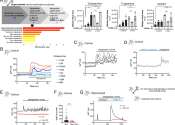Early gene therapy results in Wiskott-Aldrich syndrome promising
Researchers reported promising preliminary outcomes for the first four children enrolled in a U.S. gene therapy trial for Wiskott-Aldrich syndrome (WAS), a life-threatening genetic blood and immune disorder, at the 57th annual ...
Dec 6, 2015
0
293







